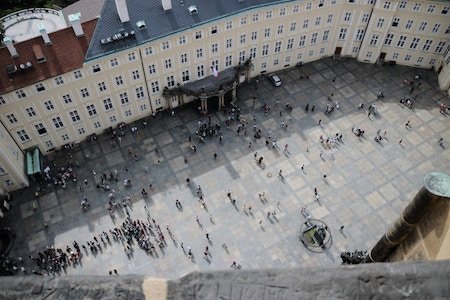
Why do Immigrants bring their religion with them?
Immigration Series: Part IV
Immigrants are sometimes recognizable in a host society by the ways they act differently. One of the more recognizable ways of acting can be motivated by religion.
I am thinking of a taxi driver I once saw stop his car, retrieve a prayer rug from the trunk, and perform salat – ritual prayer done 5 times each day by observant Muslims.
Because I live in a Christian culture, this immediately triggered a story for me about who this person was and how they came to be on their knees in a gas station parking lot.
This brings up a question right away: Why doesn’t the person just assimilate to the new host culture? Move to the United States (in this case), learn English, become Christian, and learn to love hot dogs, action movies, and pizza like other Americans. But wait: Pizza is Italian, though, right?
Never mind pesky questions that blur the lines of my tidy narrative. We’re talking about religion.
One of the ways I try to understand issues like this one – why people who immigrate don’t just assimilate – is to imagine myself in their situation. If I were Christian and my religion gave me great comfort, I would probably feel a great deal of gratitude or loyalty to it. If circumstances then changed in my own country and became bad enough that I had no other choice but to leave, it makes sense that I would take my religion with me, no? After all, my faith might be the one thing that carried me this far and gave me the strength to consider leaving my home in search of something better.
Why would I abandon the very God who allowed me to survive and make this change?
Although the religions might be different depending on the context, immigrants move all over the world: from Turkey to Germany, from South America to Asia, from India to Africa. It only makes sense that they would bring their religious practices with them. Imagine yourself in a strange new place where the language, the customs, and the culture are completely unfamiliar. Would you long for the comfort of the home you remember? Would you jump at the chance to create a sense of community – the familiar – among all the foreign? I would.
This is why we find small, but vibrant Brazilian Catholic church communities in Japan, Korean Christian Churches in San Francisco, and Mosques in London.
I have come to understand that religion is an inseparable part of culture, even for those who deny that religion. The Western calendar is calibrated off of Jesus’ birth. Our culture ebbs and flows in a yearly cycle marked by Christian festivals like Christmas and Easter (which were themselves overlaid on pre-Christian religious festivals). Our criminal courts have a jury of twelve, one representing each tribe of Israel, our Presidents place their hand on the Christian Bible to profess their adherence to its code as they are sworn into office.
Religion, which means, “that to which we bind ourselves,” is yet another story with many levels. On the surface, it is often a system of beliefs and practices that one uses to be in relationship with God or some higher power. Like other cases, there is also a deeper, sometimes hidden story about not being alone.When all else fails, when everyone and everything I know has left or has changed, my religion binds me to the one thing that does not – and will not – change.
Why not cast that off and assimilate to the religion of a new culture? Some do, of course, but I have to ask, “why would I?”





